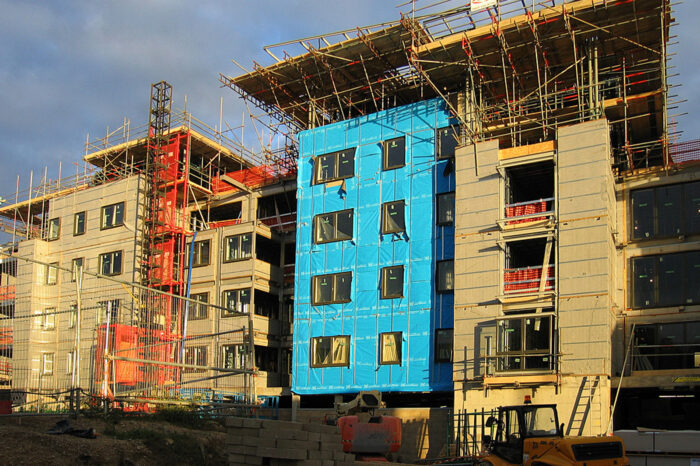Powering Ottawa’s Future: District Energy And The Smart Building Revolution

IN TODAY’S RAPIDLY evolving world, the demand for energy-efficient solutions has never been higher. With climate change concerns, rising energy costs, and the need for sustainable practices, businesses and governments are actively seeking ways to reduce their carbon footprint and optimize energy consumption.
District energy systems are no exception. With the ever-increasing push for decarbonization to meet government mandates, district energy and campus heating and cooling networks are in a unique position to offer a wide range of benefits to businesses, residents, and the environment. However, the journey toward a greener, more sustainable future could be further accelerated by integrating smart building technology into district energy initiatives.

Anthony Man
Smart Building Consultant
WSP – Canada
Realizing Environmental, Financial Savings
One of the most significant benefits of district energy systems is the substantial cost savings they offer. Through energy-efficient upgrades and initiatives, district energy systems help businesses and residents reduce their energy bills. This not only eases the financial burden on individuals and organizations but also frees up resources for investment in other critical areas. Moreover, these cost savings help drive economic growth and prosperity.
District energy can also play a pivotal role in helping clients meet their sustainability goals. By encouraging the adoption of clean energy technologies and practices, these systems help cities significantly reduce their carbon footprint. This aligns with Canada’s broader commitment to combat climate change, helping cities like Ottawa lower greenhouse gas emissions and transition to a more sustainable future.
As district energy gains popularity in the Canadian market, we are becoming more aware of how it can spur job creation and economic growth. These projects have generated a demand for skilled workers in sectors such as construction, renewable energy, and green technology, creating new opportunities for the next generation of the energy and buildings workforce. This not only benefits the local economy but also fosters innovation and entrepreneurship within the community.
District energy systems simplify energy management for businesses and individuals by providing a centralized platform for energy consumption data and analysis. This empowers users to make informed decisions about their energy usage. This streamlined approach to energy management leads to more efficient operations and a greater focus on sustainability.

George Treheles Senior
Technology Consultant
WSP- National Capital Region
The Smart Building Revolution: A Perfect Partner for District Energy
While these systems already take substantial strides in the journey toward a sustainable energy future, the integration of smart building technology can take these efforts to the next level. Smart buildings are equipped with advanced sensors, automation systems, and data analytic capabilities that optimize energy usage, enhance occupant comfort, and reduce environmental impact. By combining the benefits of district energy with smart building technology, cities like Ottawa can unlock a new realm of possibilities.
Smart building technology and building automation technology both play roles in modernizing and optimizing building operations, but they differ significantly in their scope and capabilities. Building automation technology primarily focuses on the control and management of individual building systems, such as HVAC, lighting, and security, through the use of sensors, controllers, and programmable logic. It enhances energy efficiency and occupant comfort, yet often operates in silos, lacking holistic integration.
In contrast, smart building technology transcends these limitations by seamlessly integrating various building systems and leveraging advanced data analytics and artificial intelligence. It provides a comprehensive and interconnected approach to building management, allowing for real-time monitoring, predictive maintenance, and adaptive responses to changing conditions. Smart buildings can optimize energy consumption, enhance occupant well-being, and improve operational efficiency on a broader scale. By harnessing the power of data and automation, smart building technology goes beyond mere automation and offers a superior, holistic solution for modern building management, ensuring sustainable and user-centric environments.
Integrating smart building technology can significantly enhance Ottawa’s sustainability efforts. These intelligent systems can automatically adjust lighting, heating, and cooling based on occupancy and environmental conditions. This leads to reduced energy waste and a smaller carbon footprint. Moreover, smart buildings can incorporate renewable energy sources like solar panels and wind turbines, further promoting sustainability.
Smart building technology prioritizes occupant comfort and productivity. With features like automated climate control, customizable lighting, and predictive maintenance, occupants experience a more comfortable and productive environment. This not only benefits businesses by increasing employee satisfaction but also aligns with the community-wide focus on improving quality of life in Ottawa.
Lastly, the integration of smart building technology enables datadriven decision-making on a broader scale. Building managers and city officials can access detailed insights into energy usage, occupancy patterns, and equipment performance. This information allows for more precise planning, investment prioritization, and policy development to further advance Ottawa’s energy management goals.

Anthony Man
Smart Building Consultant
WSP – Canada
Challenges and Considerations
While the benefits of integrating smart building technology are evident, there are challenges and considerations that must be addressed:
- Initial Investment: Implementing smart building technology can require a significant upfront investment. However, the long-term cost savings and environmental benefits often outweigh the initial costs.
- Cybersecurity: As smart buildings rely on interconnected systems and data sharing, cybersecurity becomes a critical concern. Adequate measures must be in place to protect sensitive data and infrastructure.
- Education and Training: Building occupants and managers may require training to maximize the benefits of smart building technology. Education initiatives can help bridge the knowledge gap.
- Privacy Concerns: Smart building technology collects vast amounts of data, raising concerns about individual privacy. Striking a balance between data collection and privacy protection is essential.
District energy systems have already proven to be a transformative force in the city’s energy landscape. By promoting energy efficiency, sustainability, and economic growth, Ottawa can continue to position itself as a leader in the pursuit of a greener future. The integration of smart building technology offers an exciting opportunity to amplify these efforts and make Ottawa a model city for sustainable urban development.
As smart buildings become increasingly prevalent and accessible, Ottawa has the chance to leverage their capabilities to reduce energy consumption, lower costs, and improve quality of life for its residents and businesses. By addressing challenges and embracing the potential of smart building technology, Ottawa can further solidify its reputation as a forward-thinking, environmentally conscious city.
As we continue to build our community in a way that supports a net zero future, finding opportunities to develop these systems can help make significant progress in our emission-reduction goals.
Through continued innovation and collaboration, Ottawa is poised to lead the way in sustainable urban development, setting an example for cities around the world to follow.
To learn more about how we’re helping property owners discover the many benefits that district energy systems can provide, visit: https://www.wsp.com/en-ca/services/district-heating-and-cooling-distribution

Authors:
Matthew Aston is the Director of Design Services, National Capital Region, for WSP in Canada, matthew.aston@wsp.com
Anthony Man is a Smart Building Consultant for WSP in Canada, hoyinanthony.man@wsp.com
George Treheles is the Senior Technology Consultant, National Capital Region, for WSP in Canada, george.treheles@wsp.com






















